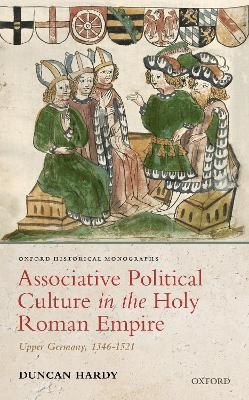
Associative Political Culture in the Holy Roman Empire
Oxford University Press (Verlag)
978-0-19-882725-2 (ISBN)
What was the Holy Roman Empire in the fourteenth to sixteenth centuries? At the turning point between the medieval and early modern periods, this vast Central European polity was the continent's most politically fragmented. The imperial monarchs were often weak and distant, while a diverse array of regional actors played an autonomous role in political life. The Empire's obvious differences compared with more centralized European kingdoms have stimulated negative historical judgements and fraught debates, which have found expression in recent decades in the concepts of fractured 'territorial states' and a disjointed 'imperial constitution'. Associative Political Culture in the Holy Roman Empire challenges these interpretations through a wide-ranging case study of Upper Germany -- the southern regions of modern-day Germany plus Alsace, Switzerland, and western Austria -- between 1346 and 1521. By examining the interactions of princes, prelates, nobles, and towns comparatively, Associative Political Culture in the Holy Roman Empire demonstrates that a range of actors and authorities shared the same toolkit of technologies, rituals, judicial systems, and concepts and configurations of government. Crucially, Upper German elites all participated in leagues, alliances, and other treaty-based associations. As frameworks for collective activity, associations were a vital means of enabling and regulating warfare, justice and arbitration, and even lordship and administration.
On the basis of this evidence, Associative Political Culture in the Holy Roman Empire offers a new and more coherent depiction of the Holy Roman Empire as a sprawling community of interdependent elites who interacted within the framework of a shared political culture.
Duncan Hardy is a historian of late medieval and early modern Europe, specializing in German and Central European history. He undertook undergraduate and graduate studies in history at the University of Oxford, and completed his doctorate under the supervision of John Watts in 2015. He subsequently held research fellowships at the Institute of Historical Research in London, the Université libre de Bruxelles, and Trinity College, Cambridge. Currently he is Assistant Professor in the Department of History at the University of Central Florida.
Introduction
Part I: part I. Shared and Interconnective Structures and Practices
1: Documentary Culture and Ritual
2: Arbitration and Para-judicial Mediation
3: Feuding and Warfare
4: Lordship and Administration
Part II: Associations and Associative Political Culture
5: Associations in Comparative Perspective: The Continuum of Alliances and Leagues
6: The Functions of Alliances and Leagues: Assistance and Adjudication
7: Associations and the Discourses of Peace, Common Weal, and Empire
8: Beyond Alliances and Leagues: the Associative Character of Political Life in the Empire
Associative Political Culture in Action: Four Case Studies
9: The 'Town War', c. 1376-89
10: Upper Germany in the Reign Of Sigismund of Luxemburg, C. 1410-37
11: Burgundian Rule on the Upper Rhine and its Aftermath, C. 1468-77
12: The Age of Imperial Reform, C. 1486-1521
Conclusion
Bibliography
Index
| Erscheinungsdatum | 17.09.2018 |
|---|---|
| Reihe/Serie | Oxford Historical Monographs |
| Verlagsort | Oxford |
| Sprache | englisch |
| Maße | 147 x 222 mm |
| Gewicht | 522 g |
| Themenwelt | Geschichte ► Allgemeine Geschichte ► Mittelalter |
| Geisteswissenschaften ► Geschichte ► Regional- / Ländergeschichte | |
| Sozialwissenschaften ► Politik / Verwaltung | |
| ISBN-10 | 0-19-882725-3 / 0198827253 |
| ISBN-13 | 978-0-19-882725-2 / 9780198827252 |
| Zustand | Neuware |
| Informationen gemäß Produktsicherheitsverordnung (GPSR) | |
| Haben Sie eine Frage zum Produkt? |
aus dem Bereich


